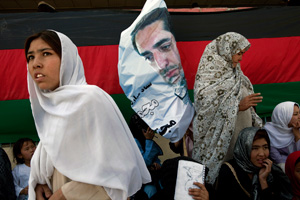Women and War Series: Peace Unveiled in Afghanistan
Hosted by Congressman Russ Carnahan, and co-hosted by the Office of Senator John Kerry and the Office of Senator Barbara Boxer, the U.S. Institute of Peace, Fork Films, the Institute for Inclusive Security, and Vital Voices, collaborated on the pre-screening and panel discussion of the new film, "Peace Unveiled" on October 5, 2011 at the Congressional Visitors Center Theater in Washington, DC.
 Hosted by Congressman Russ Carnahan, and co-hosted by the Office of Senator John Kerry and the Office of Senator Barbara Boxer, the U.S. Institute of Peace, Fork Films, the Institute for Inclusive Security, and Vital Voices, collaborated on the pre-screening and panel discussion of the new film, "Peace Unveiled." A discussion followed with film producer Abigail E. Disney, film director Gini Reticker, and Michelle Barsa, Lead Advocate and Afghanistan Program Specialist at the Institute for Inclusive Security, and moderated by Kathleen Kuehnast, director of USIP's Gender and Peacebuilding Center.
Hosted by Congressman Russ Carnahan, and co-hosted by the Office of Senator John Kerry and the Office of Senator Barbara Boxer, the U.S. Institute of Peace, Fork Films, the Institute for Inclusive Security, and Vital Voices, collaborated on the pre-screening and panel discussion of the new film, "Peace Unveiled." A discussion followed with film producer Abigail E. Disney, film director Gini Reticker, and Michelle Barsa, Lead Advocate and Afghanistan Program Specialist at the Institute for Inclusive Security, and moderated by Kathleen Kuehnast, director of USIP's Gender and Peacebuilding Center.
"Peace Unveiled" is the third episode of "WOMEN, WAR & PEACE," a groundbreaking five-part PBS television series that explores women's strategic role in conflict and peacebuilding. This documentary follows three Afghan women who have organized to protect women’s rights from being traded away in the reconciliation and reintegration process, as security operations begin to shift from ISAF to Afghan control. Convinced that the Taliban will have demands that jeopardize hard-earned gains, they maneuver against formidable odds to have their voices heard in a peace jirga and high peace council. The "WOMEN, WAR & PEACE" series shines a light on women who are changing the rules of engagement in conflict zones from Colombia to Bosnia, Afghanistan to Liberia. It shows women not as victims, but as strong agents of change. The series airs on consecutive Tuesdays, starting October 11th through November 8th on PBS.
Important! Outside attendees should enter through the main doors of the U.S. Capitol Visitor Center Orientation Theater-South. You will be required to go through security, and must bring a copy of the invitation in order that Capitol Police can verify access for appropriate individuals.
Please note!! For security reasons, many items are not permitted inside the U.S. Capitol Visitor's Center. View a list of the NOT permitted inside the U.S. Capitol Visitor’s Center.
Speakers include:
- Congressman Russ Carnahan (D-MO 3rd District)
- Abigail Disney
Producer, “Peace Unveiled”
Founder of Fork Films - Gini Reticker
Director, “Peace Unveiled” - Michelle Barsa
Lead Advocate and Afghanistan Program Specialist
The Institute for Inclusive Security - Laurie Schultz-Heim
Director, Congressional Affairs
U.S. Institute of Peace - Kathleen Kuehnast, Moderator
Director, Gender and Peacebuilding Center
U.S. Institute of Peace
Also a Part of the Women and War Series:
- Global Security: Through a Bosnian Lens with Amb. Swanee Hunt and Deputy Administrator Donald Steinberg, Panel Discussion & Film | October 25, 2011
Location: U.S. Institute of Peace
Time: 3:00 - 5:30pm with reception to follow
USIP, in collaboration with the Institute for Inclusive Security, USAID, and Vital Voices, will host a discussion with Ambassador Swanee Hunt and USAID’s Deputy Administrator Donald Steinberg on lessons emerging from the Bosnia conflict with a particular focus on the best ways to ensure a direct role for women in peace-building efforts worldwide. In addition, film producer Abigail Disney and film director Pamela Hogan will present their PBS documentary, “I Came to Testify,” that describes how a group of 16 women from Bosnia, victims of the war’s systematic rapes, broke through political and societal silence by stepping onto the witness stand at an international tribunal.
Explore Further
- Learn more about USIP's Gender and Peacebuilding Center
- Learn more about the "WOMEN, WAR, & PEACE" series on PBS, starting October 11th through November 8th
- Learn more about Fork Films and other documentaries produced by Abigail Disney
- Learn more about Ambassador Hunt's book, "Worlds Apart"
- View a map of the U.S. Capitol Visitor Center Orientation Theater—South
Related Academy Courses
- Overseas Religious Engagement
- Advising and Mentoring in a Reform Environment
- Engaging with Identity-Based Differences



